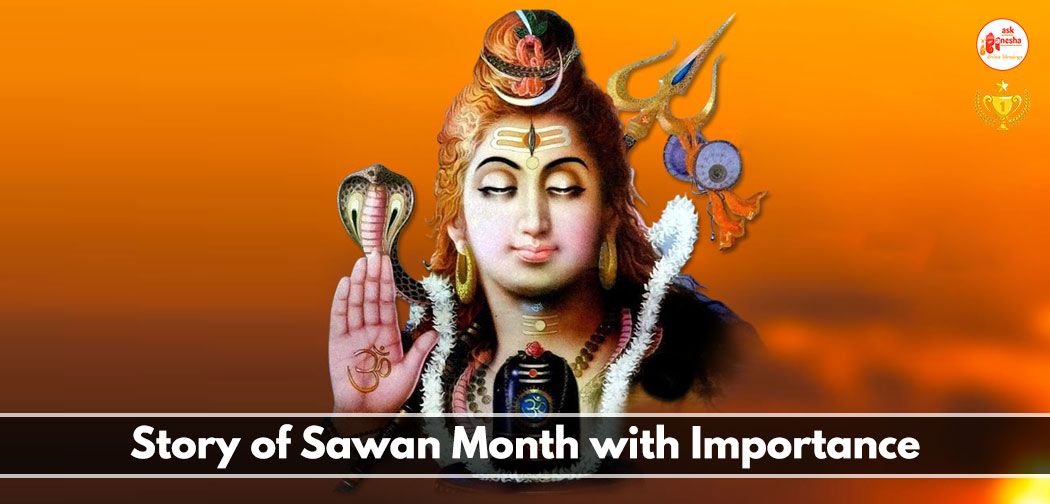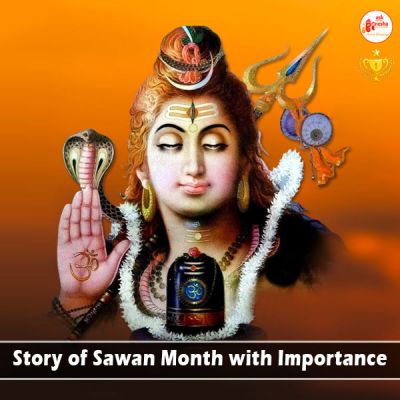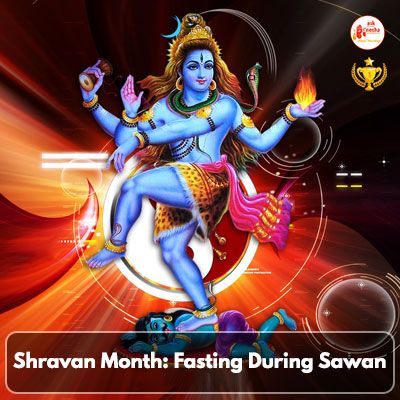Sawan, also known as Shravan, is a sacred month in the Hindu calendar that holds great religious and cultural significance in India and Nepal. This month usually falls between July and August, marking the fifth month of the Hindu lunar calendar.
The story of Sawan month can be traced back to ancient Hindu mythology and legends. According to Hindu beliefs, during the cosmic churning of the milky ocean, known as Samudra Manthan, numerous divine and celestial objects were obtained. One of the elements that emerged from the ocean was the poison called Halahal. To protect the universe from the destructive power of the poison, Lord Shiva, the supreme deity in Hinduism, drank it. However, his consort, Goddess Parvati, pressed his throat to prevent the poison from reaching his stomach, turning his throat blue. This event bestowed Lord Shiva with the name "Neelkantha," meaning "the one with a blue throat."
Since then, the month of Sawan became closely associated with Lord Shiva, and his devotees began observing various rituals and practices during this time. It is believed that worshiping Lord Shiva during Sawan brings blessings, protection, and the fulfillment of desires.
Tradition and Culture in Sawan Month
During Sawan, devotees engage in customs and traditions such as the Kanwar Yatra. In this pilgrimage, devotees carry water from sacred rivers, especially the Ganges, in small pots called kanwars. They walk long distances to Shiva temples, pouring the sacred water on Shiva lingams, the symbolic representation of Lord Shiva. This act symbolizes their search for the divine water to cool down Lord Shiva's throat after consuming the poison.
Another significant practice during Sawan is observing fasts on Mondays, known as "Sawan Somvar Vrat." Devotees abstain from food and often follow a sattvic (pure) vegetarian diet. They visit Shiva temples, offer prayers, and chant mantras to seek the blessings of Lord Shiva.
Sawan month is also marked by grand celebrations. Devotees decorate Shiva temples with flowers and lights, and special puja ceremonies are performed. Bhajans (devotional songs) and religious discourses dedicated to Lord Shiva are organized. Additionally, culturally, Sawan is considered an auspicious time for weddings and other festive occasions. People wear blue-colored attire, which is associated with Lord Shiva, and offer milk, water, and Bilva leaves to Shiva lingams.
The history of Sawan month is deeply rooted in Hindu mythology and continues to be celebrated with immense devotion by millions of Hindus worldwide. It serves as a time for spiritual reflection, devotion, and seeking the blessings of Lord Shiva. Sawan reminds people of the power of faith and the significance of Lord Shiva in Hinduism.
Rise of Sawan Month
The rise of Sawan month, in Hindu culture can be attributed to its historical and mythological significance, as well as its association with Lord Shiva. Sawan has gradually gained prominence and become an important observance in the Hindu calendar over time.
The origins of Sawan month can be traced back to ancient Hindu mythology and scriptures. The story of Lord Shiva consuming the poison during the cosmic churning of the milky ocean and his consort, Goddess Parvati, pressing his throat to prevent its spread is a central theme in the Hindu narrative. This mythological event, often referred to as the "Churning of the Ocean" or "Samudra Manthan," played a significant role in the rise of Sawan month. Lord Shiva's act of consuming the poison to protect the universe earned him the name "Neelkantha" or "the one with a blue throat." This incident, along with the subsequent devotion and reverence towards Lord Shiva, contributed to the rise of Sawan month as a time of worship and observance dedicated to Lord Shiva.
Importance of Sawan Month
Sawan month holds immense importance in Hindu culture and is considered a sacred month in the Hindu calendar. The significance of Sawan month can be understood from multiple perspectives, including religious, spiritual, and cultural aspects. Here are some key reasons why Sawan month is considered important:
Devotion to Lord Shiva: Sawan month is primarily associated with Lord Shiva, one of the principal deities in Hinduism. Lord Shiva is believed to be easily pleased during this time, and devotees engage in various rituals, prayers, and offerings to seek his blessings and protection. It is believed that sincere devotion during Sawan can lead to spiritual progress and fulfillment of desires.
Purification and Renewal: Sawan is often seen as a period of purification and self-renewal. Devotees observe fasts, practice meditation, and engage in acts of self-discipline and self-control. The focus on these practices during Sawan is believed to cleanse the body, mind, and soul, and to help individuals cultivate virtues and overcome negative tendencies.
Connection with Nature: Sawan coincides with the rainy season in many parts of India, which is considered a time of abundant natural energy and fertility. The lush greenery and the refreshing rains are seen as symbolic of growth, vitality, and rejuvenation. Devotees embrace this connection with nature and perceive it as an opportunity to deepen their spiritual connection with the divine.
Kanwar Yatra: The Kanwar Yatra, a pilgrimage observed during Sawan, is an integral part of the month's significance. Devotees undertake long journeys, often barefoot, to fetch sacred water from rivers like the Ganges. The act of carrying and offering this sacred water to Lord Shiva is believed to cleanse sins and grant blessings. The Kanwar Yatra fosters a sense of community, devotion, and sacrifice among the participants.
Festivals and Celebrations: Sawan encompasses various festivals and celebrations that add to its importance. Raksha Bandhan, a festival celebrating the bond between siblings, is observed during this month. Teej, a festival primarily celebrated by women, also falls in Sawan. These festivities provide an opportunity for families and communities to come together, strengthen relationships, and express joy and gratitude.
Cultural Significance: Sawan month has become deeply ingrained in Hindu culture and traditions. It is associated with specific practices, such as wearing blue-colored clothing, offering milk, water, and Bilva leaves to Lord Shiva, and engaging in devotional songs and dances. These cultural customs serve to deepen the connection between individuals and their religious heritage.
Conclusion
Overall, the importance of Sawan month lies in its ability to inspire devotion, self-reflection, and spiritual growth. It provides a dedicated time for devotees to deepen their connection with the divine, seek blessings, and strengthen their spiritual journey. Sawan month also serves as a reminder of the harmony between nature, culture, and religious beliefs within Hinduism.
Frequently Asked Questions?
Q1. When Does Sawan 2023 start?
Ans. Sawan 2023 will start from July 4th and end on August 30th, 2023.
Q2. How many Somwar are there in Sawan 2023?
Ans. There will be 8 Somwars this Sawan instead of 4.
Q3. Why is the month of Sawan special this year?
Ans. Sawan will be extended for two months instead of one due to the presence of Adhik Maas or Malmaas.
For Interesting Astrology Videos and Posts, Follow us on Instagram
























 Translate
Translate